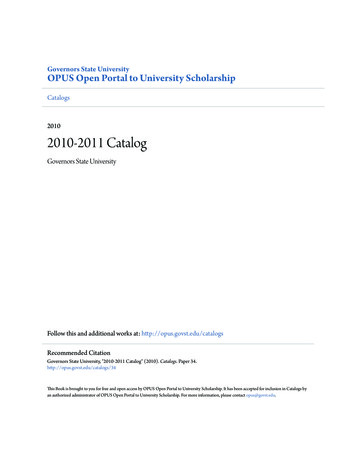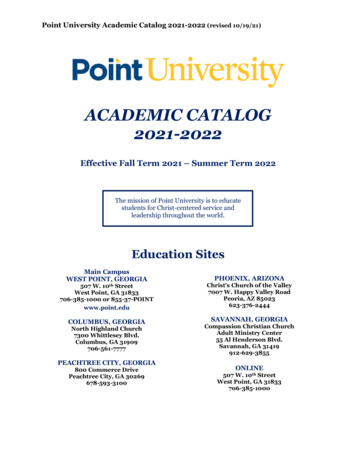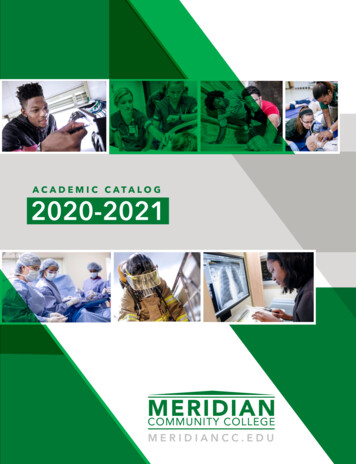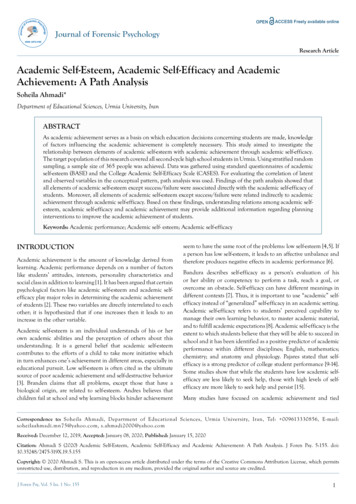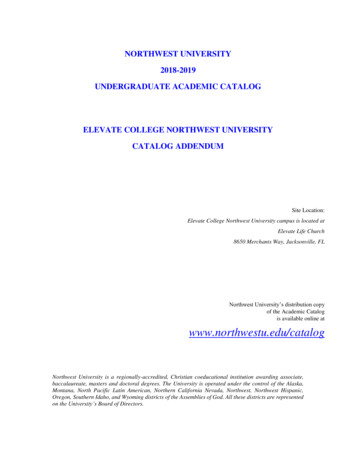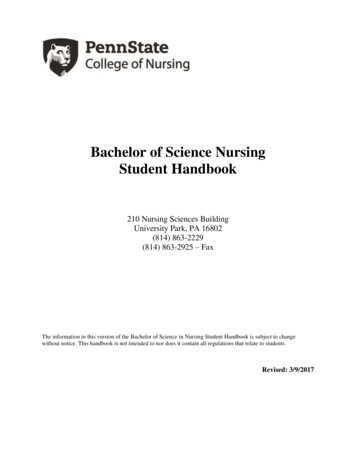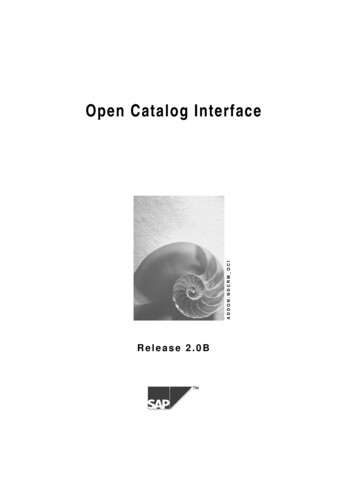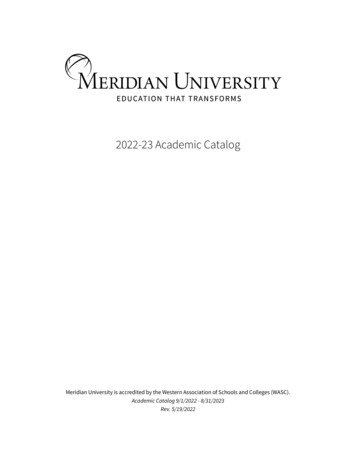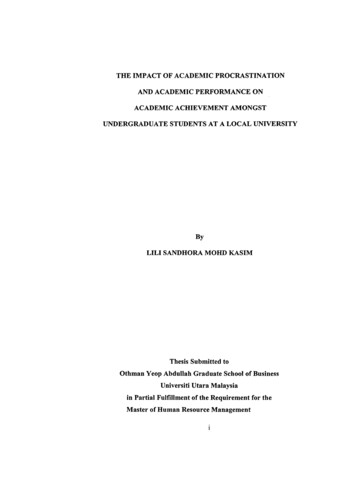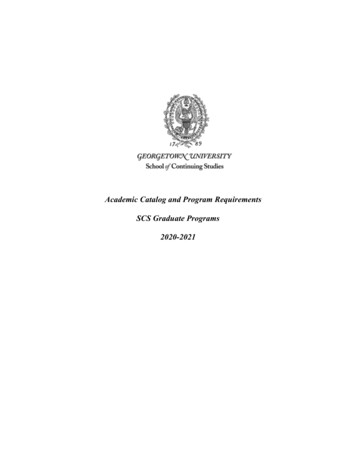
Transcription
Academic Catalog and Program RequirementsSCS Graduate Programs2020-2021
Table of ContentsGraduate Certificate Programs5Minimum Requirements for the Professional Studies Graduate Certificate5Matriculation to an MPS Degree5Academic Standing5Good Academic Standing5Academic Probation6Academic Dismissal6Program Guidelines: Graduate Certificate in Competitive Business Intelligence7Graduate Certificate Requirements in Competitive Business Intelligence7Program Guidelines: Graduate Certificate in Cybersecurity Risk Management9Graduate Certificate Requirements in Cybersecurity Risk ManagementProgram Guidelines: Graduate Certificate in Lean and Agile PracticesGraduate Certificate Requirements in Lean and Agile PracticesMaster of Professional Studies and Executive Masters of Professional Studies9111112Master of Professional Studies (MPS) Description12Learning Goals for the Professional Studies Graduate Degree12Minimum Requirements for the Professional Studies Graduate Degree13Core Course Requirements (Ethics and Capstone)13Foundation Course Requirements14Concentration Requirements and Focus Areas14Executive MPS Degree (EMPS) Description15Academic Standing15Good Academic Standing15Academic Warning16Academic Probation16Termination of Degree Candidacy16Academic Dismissal (Provisional, Non-Degree Students)17Program Guidelines: Applied Intelligence17MPS Degree Requirements in Applied Intelligence18Corresponding Graduate Certificate19Program Guidelines: Masters of Professional Studies in Cybersecurity Risk Management20MPS Degree Requirements in Cybersecurity Risk Management20Corresponding Graduate Certificate211
Program Guidelines: Design Management & Communications22MPS Degree Requirements in Design Management & Communications22Program Guidelines: Emergency & Disaster Management (Executive MPS)24Executive MPS Degree Requirements in Emergency & Disaster ManagementEMPS EDM 2020/2021 Travel Dates*Program Guidelines: International Emergency & Disaster Management (Executive MPS)EMPS IEDM 2020/2021 Travel Dates*Program Guidelines: Emergency & Disaster Management (MPS)MPS Degree Requirements in Emergency & Disaster ManagementProgram Guidelines: Global Hospitality LeadershipMPS Degree Requirements in Global Hospitality LeadershipProgram Guidelines: Higher Education AdministrationMPS Degree Requirements in Higher Education AdministrationProgram Guidelines: Human Resources ManagementMPS Degree Requirements in Human Resources ManagementProgram Guidelines: Integrated Marketing CommunicationsMPS Degree Requirements in Integrated Marketing CommunicationsProgram Guidelines: JournalismMPS Degree Requirements in JournalismProgram Guidelines: Project ManagementMPS Degree Requirements in Project ManagementProgram Guidelines: Public Relations & Corporate CommunicationsMPS Degree Requirements in Public Relations & Corporate CommunicationsProgram Guidelines: Real EstateMPS Degree Requirements in Real EstateProgram Guidelines: Sports Industry ManagementMPS Degree Requirements in Sports Industry ManagementProgram Guidelines: Supply Chain ManagementMPS Degree Requirements in Supply Chain ManagementProgram Guidelines: Systems Engineering ManagementMPS Degree Requirements in Systems Engineering ManagementProgram Guidelines: Technology 575761616565676769MPS Degree Requirements in Technology Management69Program Guidelines: Urban & Regional Planning Program722
Degree RequirementsMaster of Arts in Liberal StudiesAcademic Standing737677Good Academic Standing77Academic Warning77Academic Probation77Academic Termination of Degree Candidacy77Academic Dismissal (Provisional, Non-Degree Students)78Master of Arts in Liberal Studies Degree Requirements78Curriculum Structure7830-Credit/Thesis Degree Plan7836-Credit/Coursework Degree Plan79Thesis Process and Requirements79Curriculum Structure83Doctor of Liberal Studies87Learning Goals of the Program87DLS Style Guide & Thesis Guidelines87Academic Standing88Good Academic Standing88Academic Warning88Academic Probation88Academic Termination of Degree Candidacy88Minimum Requirements for the DLS Degree89Curriculum Structure89Required Foundational Courses89Elective Requirements90Qualifying Examination: LSHV-99091Written Qualifying Examination91Oral Qualifying Examination92Doctoral Thesis Proposal & Writing: LSHV-99592Thesis Proposal Defense93Doctoral Thesis Writing: LSHV-99694Oral Defense of the Written Doctoral Thesis95Steps after the Oral Defense963
The University may update its policies, procedures, admissions requirements, curriculum, courseofferings and requirements, course delivery modes or methods (including whether virtual or inperson), arrangement of courses, academic and semester calendar, schedule, and durationgraduation or degree requirements, conditions for eligibility for financial aid, tuition rates andfees, and resources and programming offered to students at any time for any reason. Anyupdates made to the Academic Catalog will be communicated to students. It is the responsibilityof each student to keep well-informed with respect to the policies and requirements in thiscatalog and all other policies of the University, school, and program in which they are enrolled.This academic catalog applies to current students and is not a contract.4
Graduate Certificate ProgramsThe School of Continuing Studies offers Graduate Certificate programs that can be completed ontheir own or as part of specific Master of Professional Studies degree programs.Graduate Certificates are offered in the following majors: Competitive Business Intelligence Cybersecurity Risk Management Lean and Agile PracticesMinimum Requirements for the Professional Studies Graduate CertificateThe requirements for all Graduate Certificate programs, regardless of major are: A minimum cumulative GPA of 3.000 12-credit hours as specified by the major These requirements cannot be waived or substituted under any circumstances. Students must complete all requirements for the Graduate Certificate at Georgetown SCS.Transfer credit is not accepted for Graduate Certificate requirements.Matriculation to an MPS DegreeStudents in good academic standing in a Graduate Certificate who would like to continue into acorresponding MPS degree program (as noted in the Graduate Academic Catalog) must submitthe Graduate Program Change form to their program for approval by the last day of classes (perthe SCS full semester academic calendar) in the semester in which the student is planning tocomplete the certificate. Pending program approval, the student will matriculate into thecorresponding MPS degree program upon successful completion of the Graduate Certificaterequirements. Upon matriculation to an MPS degree program students must meet all of theacademic standards and program requirements laid out for the degree.Students who successfully complete a Graduate Certificate but fail to submit the GraduateProgram Change form by the deadline or decide to pursue an MPS degree at a later time mustsubmit an admissions application to be considered for an MPS degree program. For moreinformation about the process, please contact the SCS Admissions office.Students who successfully complete a Graduate Certificate and would like to continue into anMPS degree program for which the certificate does not correspond to must submit an admissionsapplication to be considered for an MPS degree program. For more information about theprocess, please contact the SCS Admissions office.Academic StandingGood Academic StandingStudents with a cumulative and semester GPA of 3.000 (solid “B”) or better are considered ingood academic standing. Georgetown does not round the GPA; thus, a student with a 2.999cumulative GPA would not be allowed to earn the certificate and would be dismissed from theprogram. There are no exceptions to this minimum academic standard.5
Academic ProbationStudents are placed on academic probation when they earn one unsatisfactory grade of “B-” orlower in a single semester or when their cumulative GPA falls below a 3.000. Unless they meetthe criteria for dismissal as outlined below, students remain on probation until their GPAimproves to a 3.000 or better.Academic DismissalWhen academic standing is reviewed at the end of each full semester, Graduate Certificatestudents are automatically academically dismissed under any of the following conditions:1. Upon accumulating one grade, 3-credits of “F” at any point, regardless of theircumulative GPA. For the purpose of evaluating academic standing, a grade of “U” isconsidered the same as an “F”.2. If their cumulative GPA is at such a low level that raising it to the required level to beeligible for certificate completion within the program credit limit (12-credits) becomesmathematically impossible. Dismissal for this reason is considered final and not open toappeal.3. If they are unable to complete program requirements with acceptable grades during theallotted time period or upon having repeated a course once (see Repeating a Coursepolicy). Dismissal for this reason is considered final and not open to appeal.4. Student is unable to complete program guidelines within the time limit for certificatecompletion.6
Program Guidelines: Graduate Certificate in Competitive Business IntelligenceFaculty Director, Frederic Lemieux, nceMission StatementThe Georgetown University Competitive Business Intelligence Graduate Certificate givesstudents the opportunity to master techniques for effectively gathering, analyzing, and applyinginformation in order to support decision-making and increase competitiveness. Grounded in aglobal perspective, students examine market trends, examine how they impact organizations, andhow they can be used to achieve competitive advantage on a global scale.Learning Goals Analyze competitive market strategies through analysis of related product, market, or share trends.Synthesize current business intelligence or trend data to support recommendations foraction.Communicate with customers, competitors, suppliers, professional organizations, orothers to stay abreast of industry or business trends.Manage the timely flow of business intelligence information to users.Collect business intelligence data from available industry reports, public information,field reports, or purchased sources.Graduate Certificate Requirements in Competitive Business Intelligence The Graduate Certificate in Competitive Business Intelligence is comprised of 12 credits(4 courses). Students are not eligible to apply transfer credits to meet graduate certificaterequirements. Students must maintain a minimum cumulative GPA of 3.000 (solid "B") to remain ingood academic standing and to be eligible to earn the certificate. The Graduate Certificate must be completed within two years of beginning the program.To earn a graduate certificate in Competitive Business Intelligence, students must successfullycomplete the following courses:MPAI 730: Competitive Intelligence Organizational DesignMPAI 735: Global Competitive IntelligenceMPAI 740: Information Science for Competitive IntelligenceMPTM: Business Intelligence, Big Data & Analytics7
Corresponding MPS Degree ProgramsCourses completed in the Competitive Business Intelligence Graduate Certificate can be appliedtowards the MPS in Applied Intelligence and MPS in Technology Management degree programrequirements.8
Program Guidelines: Graduate Certificate in Cybersecurity Risk ManagementFaculty Director, Frederic Lemieux, Mission StatementThe Georgetown University Cybersecurity Risk Management Graduate Certificate gives studentsthe opportunity to acquire the critical knowledge required in order to develop: compliant riskmanagement policy, implement effective prevention and mitigation strategies; and/or manage thecommunication of risk across the enterprise.Learning Goals Design and implement a cybersecurity governance framework.Develop and deploy an effective employee awareness and training campaign.Identify, assess, and manage cybersecurity risks across the organization.Analyze the impact of emerging technologies on organization network and infrastructuresecurity.Integrate regulations and compliance requirements with cybersecurity strategies.Advocate and articulate cybersecurity investments.Communicate effectively with IT professionals and key business stakeholders.Implement cybersecurity strategies that respect ethical principles.Graduate Certificate Requirements in Cybersecurity Risk Management The Graduate Certificate in Cybersecurity Risk Management is comprised of 12 credits(4 courses). Students must select four courses form the core and foundation course offerings; studentsare not permitted to enroll in the Capstone course. Students are not eligible to apply transfer credits to meet graduate certificaterequirements. Students must maintain a minimum cumulative GPA of 3.000 (solid "B") to remain ingood academic standing and to be eligible to earn the certificate. The Graduate Certificate must be completed within two years of beginning the program.To earn a graduate certificate in Cybersecurity Risk Management, students must successfullycomplete 4 courses (12 credits) from the following core and foundation course offerings:MPCR 500: Ethics in CybersecurityMPCR 750: Information Security*MPCR 620: Cybersecurity Governance FrameworkMPCR 661: Information Assurance and Risk Management*MPCR 605: Security Architecture and Design9
MPCR 610: Information Security Laws and Regulatory ComplianceMPCR 615: Communication Strategy for Information Security ProfessionalsMPCR 600: Disruptive Technology and Organizational Change*Courses cross-listed with the MPS Technology Management and/or MPS Applied IntelligenceprogramsCorresponding MPS Degree ProgramsCourses completed in the Cybersecurity Risk Management Graduate Certificate can be appliedtowards the MPS in Cybersecurity Risk Management degree program requirements.Note: Students who complete MPCR 500 to earn the Graduate Certificate must earn a grade of“B” or better for the course to be counted towards the MPS Degree requirements.10
Program Guidelines: Graduate Certificate in Lean and Agile PracticesFaculty Director, George Moschoglou, duate-certificate-in-lean-agile-practicesMission StatementThe Georgetown University Lean and Agile Practices Graduate Certificate will providetechnology professionals with techniques, skills, and tools that will enable them to build Agilediscipline. It will also ease the traditional Project Manager role transformation into the newparadigm of agility.Graduate Certificate Requirements in Lean and Agile Practices The Graduate Certificate in Lean and Agile Practices is comprised of 12 credits (4courses). Students are not eligible to apply transfer credits to meet graduate certificaterequirements. Students must maintain a minimum cumulative GPA of 3.000 (solid "B") to remain ingood academic standing and to be eligible to earn the certificate. The Graduate Certificate must be completed within two years of beginning the program.To earn a graduate certificate in Lean and Agile Practices, students must successfully completethe following courses:MPPM 735: Fundamentals of Agile PMMPPM 740: Lean-Agile with Scrum and KanbanMPPM 755: Agile Frameworks for Lean EnterprisesMPTM 760: DevOps EssentialCorresponding MPS Degree ProgramsCourses completed in the Lean and Agile Practices Graduate Certificate can be applied towardsthe MPS in Project Management or MPS in Technology Management degree programrequirements.11
Master of Professional Studies and Executive Masters of Professional StudiesMaster of Professional Studies (MPS) DescriptionColleges and universities offer a variety of graduate-level degrees, such as the more traditional,research-focused Master of Arts (MA) and Master of Science (MS); the arts-focused Master ofFine Arts (MFA); and those degrees focused on specific aspects of industry, including the Masterof Public Administration (MPA), the Master of Business Administration (MBA), and the Masterof Professional Studies (MPS). These degrees are further differentiated by such factors as theirpedagogical focus, curricula (course offerings and requirements), and culminating projects.Each of the MPS majors in the School of Continuing Studies focuses on applied, practicallearning targeted to professional careers in the following areas: Applied Intelligence, AICybersecurity Risk ManagementDesign Management & Communications, DMCEmergency & Disaster Management, EDM (Executive MPS, International ExecutiveMPS, and MPS)Global Hospitality Leadership, GHLHigher Education Administration, HEAHuman Resources Management, HRMIntegrated Marketing Communications, IMCJournalism, JOProject Management, PMPublic Relations & Corporate Communications, PRCCReal Estate, RESports Industry Management, SIMSupply Chain Management, SCMSystems Engineering Management, SEMTechnology Management, TMUrban & Regional Planning, URPThe minimum school-wide requirements for the MPS degree are described below; however, eachprogram can have additional and/or stricter requirements specific to their major. Therefore,students are encouraged to maintain regular contact with their academic advisors throughouttheir studies.Learning Goals for the Professional Studies Graduate DegreeThe Professional Studies degree was created to help students develop the advanced academic andprofessional skills needed to succeed in their chosen field.Students who complete the MPS degree in these fields will:1. Apply creative and critical thinking to generate novel and relevant ideas, strategies,12
2.3.4.5.6.7.approaches, or products.Analyze and respond effectively to global issues relevant to industry practice andcollaborate with diverse actors in an intercultural setting.Develop strategies to incorporate Georgetown values that address social justice andethical decision-making relevant to industry practice.Integrate theory, research, and professional experience with industry-specific knowledge,methods and skills in order to collaboratively develop and execute solutions to complex,real-world problems.Retrieve information from a variety of sources, assess its credibility, validity, andreliability, and integrate/creatively use it to support data-driven decisions in aprofessional environment.Creatively use relevant technology to access and evaluate information, solve problems,collaborate, and design innovative solutionsCraft professional, creative, and persuasive messages that convey complex ideas andrelevant solutions.In addition to the goals described above, each Professional Studies major has learning goals thatare specific to that particular academic and professional field.Minimum Requirements for the Professional Studies Graduate DegreeThe Core requirements for all Professional Studies programs, regardless of the major are: A minimum cumulative GPA of a 3.000 Core course: Ethics Core course: Capstone These requirements cannot be waived or substituted under any circumstances. Neither theEthics nor Capstone course can be transferred into Georgetown SCS from anotherinstitution or academic program.Core Course Requirements (Ethics and Capstone)Ethics and Capstone are the two Core courses unique to the Professional Studies degree and arerequirements in all of the majors. Neither the Ethics nor Capstone course can be transferred intoGeorgetown SCS from another institution or academic program. Similarly, Core courses cannotbe waived under any circumstances. Ethics is a core component of “Theory & Framework”(MPEM 500) in the EDM program cannot be transferred into Georgetown SCS or waived.Students should take the Ethics course within their first two semesters of enrollment as it sets thefoundation for ethical behavior within that field. The Capstone course is taken in the student’sfinal semester before graduation.Due to the academic requirements and time commitment expected of students in Capstone, westrongly recommend that students take this course by itself or with no more than one additionalcourse during their final semester. If possible, Capstone should be taken as the only course in13
the final semester. Academic program advisors may deny student requests to take an additionalcourse with Capstone that is not required to meet the degree and program requirements.International students on University-sponsored Visas should contact the International ProgramAdvisor if they plan on registering part-time in their final semester. They may qualify for aspecial exemption to their Visa while in part-time status on a one-time basis. There is noguarantee of exemption, so international students must contact the International Program Advisorin advance of their final semester to discuss this option.All MPS majors require a grade of “B” (3.00) or better in Ethics and Capstone; both are requiredfor graduation. Review the individual program requirements for minimum grade requirements.Students who earn a “B-” (2.67) or lower in Ethics or Capstone cannot graduate, even if theyhave a cumulative GPA of 3.000 overall. These students are required to repeat the course with a“B” or better (see repeating a course policy in the SCS Academic Rules & Regulations) toprevent degree candidacy termination. Both grades remain on the student’s transcript and arefactored into the cumulative GPA.Foundation Course RequirementsIn addition to the required Core courses (Ethics and Capstone), some programs have foundationand major requirements. Foundation requirements are integral courses that provide students withthe academic background needed for success within those programs and professions. In somecases, programs may require students to earn minimum grades of “B” (3.000) or better to satisfya requirement (students should consult with their program to ensure that they meet all additionalrequirements for those majors and the “Program Guidelines” section of this Handbook).The Schedule of Classes available at registrar.georgetown.edu/ includes course notes and/ordescriptions and typically states which courses fulfill a foundation, major, or concentrationrequirement.A. All traditional Master of Professional Studies courses are found under “Prof Studies”followed by the major designationB. All Executive Professional Studies EDM courses are found under “Exec Prof StudiesEmerg Mgmt.”Concentration Requirements and Focus AreasA concentration is a cohesive collection of four or more courses (12 credits minimum; someprograms may require more credits for a concentration) within an academic program that allowsstudents to tailor their studies in a particular area of expertise.14
Some majors require students to complete an official area of concentration for the degree; otherprograms allow a more flexible, individualized program with recommended courses for studentsto build expertise within an unofficial concentration (also called a focus area).Students who enroll solely in online courses or who choose not to designate a Concentrationofficially (within those programs that have them) will be considered "generalists" within theirprogram. For those programs that have official Concentrations, students must submit aDeclaration of Concentration form to their academic program for review and approval. Theprogram will forward approved Concentration forms to the Office of Academic Affairs andCompliance for final approval.Students who wish to complete additional coursework for more than one official concentrationcan cross-count no more than one course (3 credits) between concentrations. Therefore, eachconcentration must consist of at least 9 original credits that apply to that concentration alone.Please note: Some programs do not allow any courses or credits to cross-count. In thoseprograms, students must complete courses that are unique to each concentration. Students mustreceive advance, written permission to register for additional coursework for more than oneconcentration (please see “Academic Overload” policy). Concentrations can be tracked in theDegree Audit function in MyAccess, but they are not listed on transcripts.Executive MPS Degree (EMPS) DescriptionThe Executive Master of Professional Studies (EMPS) degree includes the Emergency &Disaster Management (EDM) and International Emergency & Disaster Management (IEDM)majors.The EMPS is typically designed as a year-long intensive program that combines technologyenhanced learning with hands-on required field-study at various domestic and internationallocations. The Executive MPS degree is a five module program (6-credits per module/course)taken in a lock-step order as a prerequisite to the next module.This is a practice-oriented curriculum – a hallmark of Georgetown’s professional studiesgraduate programs – putting students in the action and encouraging expansive thinking aboutcurrent strategies and systems.Academic StandingGood Academic StandingStudents with a cumulative and semester GPA of 3.000 (solid “B”) or better are considered ingood academic standing. Good academic standing is required to be considered for some specialrequests at the School-level (such as participation in the Consortium of Universities) and forother requests at the program level (such as approval for certain internships and independentstudies). Georgetown does not round the GPA; thus, a student with a 2.999 cumulative GPAwould not be allowed to graduate and would be terminated from the program. There are noexceptions to this minimum academic standard.15
Academic WarningStudents with a semester GPA under 3.000 but with a cumulative GPA of 3.000 or better areplaced on academic warning. A notice is sent to the student and the student’s academic programwhen a student is on warning. Students are academically terminated upon accumulating threegrades or 9-credits of “B-” or lower and their cumulative GPA is below 3.000; therefore, wenotify students upon earning even one unsatisfactory grade. Some programs may require ameeting when a student is placed on Warning.Academic ProbationStudents are placed on academic probation when (1) they earn one “F” or “U” in a singlesemester; or (2) when their cumulative GPA falls below a 3.000. Unless they meet the criteriafor termination or dismissal as outlined below, students remain on probation until their GPAimproves to a 3.000 or better. Students placed on probation due to earning a grade of “F” or “U”in a single semester remain at-risk of termination upon earning an additional “F” or “U,”regardless of their cumulative GPA. Some majors may require a meeting with their programleadership when a student is placed on Probation.Termination of Degree CandidacyWhen academic standing is reviewed at the end of each full semester, MPS students areautomatically terminated from degree candidacy under any of the following conditions:1. Upon accumulating two grades or 6-credits of “F” at any point, regardless of theircumulative GPA. For the purpose of evaluating academic standing, a grade of “U” isconsidered the same as an “F”.2. Upon accumulating three grades or 9-credits of “B-” or lower and their cumulative GPAis below 3.000.3. If their cumulative GPA is at such a low level that raising it to the required level to beeligible for graduation within the program credit limit becomes mathematicallyimpossible. Termination for this reason is considered final and not open to appeal.4. If they are unable to complete program requirements with acceptable grades (such asEthics and Capstone with a “B” or better in each) during the allotted time period or uponhaving repeated a course once (see Repeating a Course policy). Termination for thisreason is considered final and not open to appeal.5. Student is making unsatisfactory progress toward a degree as defined by that student’sspecific major or is unable to complete program guidelines within the time limit fordegree completion.16
Academic Dismissal (Provisional, Non-Degree Students)When academic standing is reviewed at the end of each full semester, provisional, non-degreestudents are automatically academically dismissed academically under any of the followingconditions:1. Upon accumulating one grade of “B-” (2.67) or lower at any point, regardless of theircumulative GPA. For the purpose of evaluating academic standing, a grade of “U” isconsidered the same as an “F”.2. If they are unable to complete individual program requirements with acceptable gradesduring the allotted time period of one academic year (fall/spring/summer).Provisional students who are ineligible to become degree-seeking and are thereforedismissed may not appeal the dismissal.17
Program Guidelines: Applied IntelligenceFaculty Director, Frederic Lemieux, ssion StatementThe Georgetown University Master’s in Applied Intelligence program prepares students toundertake complex intelligence projects by applying the analytical frameworks and tools used inthe fields of homeland security, law enforcement, and business intelligence.Learning GoalsUpon successfully completing the Applied Intelligence program, students will:1. Apply analytical techniques to challenge or provide alternative perspectives to existingviews on complex intelligence issues2. Integrate global perspective and international best practices to intelligence analyticalproducts.3. Employ ethical decision frameworks to respond to moral dilemmas in appliedintelligence fields.4. Prepare intelligence analytic products based on industry standards to enhanceorganizational effectiveness and provide alternative perspectives on increasingly complexproblems.5. Apply the intelligence cycle t
To earn a graduate certificate in Competitive Business Intelligence, students must successfully complete the following courses: MPAI 730: Competitive Intelligence Organizational Design MPAI 735: Global Competitive Intelligence MPAI 740: Information Science for Competitive Intelligence MPTM: Business Intelligence, Big Data & Analytics
